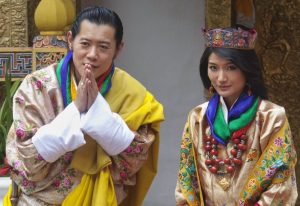The University of Hong Kong’s (HKU) Centre of Buddhist Studies recently held a conference titled “Buddhist Canons: In Search of a Theoretical Foundation for a Wisdom-oriented Education.” From 27–28 November, the speakers and guests deliberated on how global society could benefit from an educational paradigm informed by cultivating wisdom over mere knowledge. Earlier in the same month, Prof. Natalie Gummer, in collaboration with academics such as Frances Garrett, Natalie Avalos, Ann Gleig, and Sarah Jacoby (all thinkers leading bold and challenging discussions about Buddhism, racial issues, environmental ethics, and social justice), presented a Zoom session on the Collective Buddhist Studies Manifesto (CBSM) at the 2021 American Academy of Religion (AAR).
Taken together, the HKU conference and the CBSM appear to be “inward-looking” initiatives that have emerged with increasing frequency, particularly in the past year. As a loosely defined “industry,” Buddhist studies is in an active process of reassessing itself, questioning old assumptions baked into its intellectual structures, and finding new ways of existing globally and online, both as an academic discipline and as a force for social good.
Not too long ago, the latter aspiration would have been criticized as irrelevant, perhaps even distasteful or disingenuous, a distraction from the former objective. More conservative voices still warn against taking “activist scholarship” too seriously. However, attitudes are changing fast due to broader shifts in society, culture, and perceptions of academia itself. For example, the CBSM website has a 10-point statement. A cursory glance over the 10 theses reveals some of the priorities that contemporary Buddhist studies scholars are grappling with, among them:
2. Anglophone academia does not have a monopoly on the academic study of Buddhism. It is important to bridge the divide between Eastern and Western scholarship. . . .
5. The field needs to welcome new ways of studying Buddhism, especially as a lived religion.
6. Gender and racial minorities continue to be underrepresented in the field of Buddhist Studies. More can be done to promote gender and racial equality. . . .
8. There’s a lot of competition for limited Buddhist Studies positions and funding. But remember to see your colleagues as friends and collaborators, not competitors.
(Collective Buddhist Studies Manifesto)
This increasing self-awareness and conscious effort to push the discipline in a more self-reflective direction has always been a point of discussion, both in the halls of universities and in monastic cloisters, thanks to the uneasy knowledge that Buddhist studies is a discipline whose doyens first emerged in European empires or their colonial territories (India, Sri Lanka, and so on). Buddhist studies was initially formed to study, often unsympathetically, an “Oriental Other:” Buddhism. There was a subsequent anti-colonial pushback from indigenous Buddhist elites who had studied at Oxford and other European universities, but there was an even broader issue: a worldwide epistemic surrender, including in the Christian West, to the criteria of scientific rationalism, which was complete by the end of World War Two.
Despite the formal retreat of colonialism, intellectual “ownership” over Buddhism was claimed decisively by “rationalist” Buddhist studies specialists in Europe and the US. Institutions across postcolonial Asia followed suit, replicating Buddhist leaders’ epistemic concession in return for legitimization in the academy, and credibility amid the broader project of rationalist globalization.
This is common knowledge to the majority of Buddhologists today. In fact, both Asian and Western scholars specializing in methodology or Buddhist ethics have been at the forefront of starting and sustaining these discussions. However, with few exceptions, the discussion about the overall state of Buddhist studies was only ever partial. This concern was often only given a panel session’s time at a given conference, or relegated to a single chapter or sub-section in an academic volume. The meta-analysis of the position of Buddhist studies was to be studied alongside preoccupations such as philology or history, rather than approached as a pressing, overarching question.
The sense of urgency gained pace dramatically this year: in some ways, the world outside of the academy was moving too quickly for those in the ivory tower to keep up. A seminal essay by Constance Kassor published in March, provocatively titled “Buddhist Studies has a Whiteness Problem” came on the heels of prominent violent crimes committed against Asian Americans in the US, and a broader reckoning of anti-Asian racism and violence. Kassor, who acknowledges that her career was a “direct result of the Orientalist assumptions and colonialist attitudes that I mention here,” writes:
While Buddhist studies is not the same as Buddhist practice, these two enterprises are not wholly separate, either. There is considerable overlap between academic scholars and practitioners of Buddhism in the US, particularly in the sense that both communities have directly benefitted from the work of Asian Buddhist teachers and communities, often without acknowledging their contributions. With this in mind, it is especially troubling that Buddhist studies has been so slow to confront a history built on extractive methods and Orientalist assumptions.
(Contending Modernities)
There are broader sociological, economic, and political concerns that have emerged from within the West. They persist today and include the decimation of public funding for humanities departments and faculties in the Anglophone world. From Australia to the UK, countries with a strong and enviable heritage in the humanities, successive governments have mischaracterized and sometimes caricatured the essential role of the arts in civil society. This has been happening since the 1980s, even at venerable institutions with illustrious reputations, as Prof. T. H. Barrett observed with The School of Oriental and African Studies (SOAS). The ongoing and notorious impoverishment and “work casualization” of many Buddhist studies professionals (associate, non-tenured, and those in fellowships) is connected to the former issue. It is a long-standing crisis that has blighted the discipline for decades, hitting BIPOC and working-class scholars hardest. The sense among Buddhist studies scholars today, particularly early career and younger ones, could be said to be: if the current state is the end point of the project that began in the late 19th and early 20th centuries, then the basic premises are deeply flawed and a major rethinking of the discipline will benefit everyone.

This has to be a unified effort, in which everyone seeks to uplift each other. From ending the erasure of Asian Buddhists in Buddhist studies, increased opportunities for BIPOC scholars, and a long-term fightback against the casualization and devaluing of the professional humanities, there are many interconnected issues that can be summarized as a “renewed examination of Buddhist studies.”
As speakers at the HKU conference noted: wisdom, the humanities, and the Buddhist Canon form three core rubrics that can inform a transformational pedagogy for contemporary education. Buddhist studies must inevitably be a part of this conversation. As a discipline, it has undeniably accomplished much since its inception in the early 20th century, from hermeneutics and exegesis to philology and critical history. But given the endemic, long-standing problems that are diminishing the discipline, perhaps the time has come for Buddhist studies to be approached on different terms altogether.
Critics of “activist scholarship” might point out that this is a futile exercise within the confines of today’s academic environment. This is probably true. However, from a more hopeful perspective, perhaps this affirms that Buddhist studies is not separate from systemic changes in the wider culture in which the institutions exist, just as how the increase in violence against Asian-Americans prompted soul-searching within the quiet libraries of Buddhist studies students and teachers. Therefore, just as the term “scholar-practitioner” has largely fallen out of favor in Buddhist discourse (since it is another arbitrary dichotomy as there was never a fundamental conflict between the two), perhaps the “activist scholar” binary, sometimes used pejoratively, will soon also become defunct.
In the end, scholarship informed by Buddhist values is universally agreed to be aimed at nurturing wisdom, and wisdom can do nothing else but make the world a better place.
See more
Ten Theses on Buddhist Studies (Collective Buddhist Studies Manifesto)
Buddhist Studies Has a Whiteness Problem (Contending Modernities)
Related features from BDG
For the Ancestors and for Peace: A Conversation with the Organizers of “May We Gather”
Buddhistdoor View: Beyond Boundaries, Beyond Fear – Responding to a Rise in Hate
Prof. T. H. Barrett and the State of Contemporary Buddhist Studies
Belt and Road, Buddhist Salvation, and Out-of-touch Vice-Chancellors: Prof. T. H. Barrett on Engaging with China
Related blog posts from BDG Tea House
Buddhist Canons: In Search of a Theoretical Foundation for a Wisdom-oriented Education
The TLKY International Conference 2021 Interview Series – Prof. Wu Jiang
The TLKY International Conference 2021 Interview Series – Dr. Georgios T. Halkias
The TLKY International Conference 2021 Interview Series – Prof. Albert Welter
The TLKY International Conference 2021 Interview Series – Dr. Ernest C. H. NG
The TLKY International Conference 2021 Interview Series – Prof. Jin Y. Park
The Collective Buddhist Studies Manifesto: New Challenges, New Voices












[…] Source link […]
[…] Source: https://www.buddhistdoor.net/features/buddhistdoor-view-scholarship-heals-the-world-self-reflection-… […]